
The Death of Innocence
27.12.25
Philosophy Football's Mark Perryman portrays John Robertson as a symbol of all that was good about the European Cup

OK England's relationship with European football didn't exactly begin well.
1955 the first European Cup. Chelsea, the First Division champions, are banned from entering by the FA, the competition is not considered as in the best interests of English football.
The competition itself is a knockout competition, two legs home and away, league champions only, no seeding. The classic FA Cup model before it too was bastardised, but that's another sad tale to tell.
The first five years marked by dominance, Real Madrid win all five competitions 1955-1960. The birth of a popular, Europeanised, football culture. The 1960 Real Madrid v Eintracht Frankfurt final, Hampden Park, crowd of 127,671, 7-3, BBC televised it, across Europe an estimated 70 million watched the game (terrestrial, no satellite TV). The greatest football match ever? And expansion, 26 nations league champions entered, up from 16 in 1955.
But tragedy too. In 1958 The Munich Air Disaster, Manchester United 's plane crashes on the way back from playing Red Star Belgrade in the quarters. Liverpool yes Liverpool, lend United players so they can complete their season. The following European Cup in another act of footballing solidarity United are invited by UEFA to enter. No such compassion from their own FA mind, who quite extraordinarily refuse to allow United to do so.
Through the 1960s the competition continues to expand. The champions of Norway, Malta, Albania. Iceland all join the competition. In 1966 Yugoslavia’s Partizan reach the semis, the first team from Communist Eastern Europe to do.
1966-67 The Champions of the Soviet Union enter for the first time. Celtic win against Dukla Prague from (East European Communist) Czechoslovakia in the semis having beaten Yugoslav (ditto) side Vojvodina in the quarters. In the final, they beat previous champions Inter. The first ‘British’ side to reach the final, and win. But this was of course an entirely Scottish victory, shaped by the sectarian divide. tho’ famously the entire Celtic team was born and grew up in Glasgow. In the first 12 years of the competitiion there had been Spanish, Portuguese, Italian and now Scottish champions of Europe.
And in 1968 Man Utd, become the first English Champions, winning the trophy, after extra time. At Wembley, incredibly exactly ten years on from Munich Air Disaster.
United's goal-scorers in the Final? Bobby Charlton (2) Brian Kidd and George Best. The core of the team: Bill Foulkes David Sadler, John Aston, Nobby Stiles, Shay Brennan and Tony Dunne. As Eamon Dunphy puts it in his superb book on Matt Busby and the troubled succession years (an essential read to understand the troubled Ferguson succession) A Strange Kind of Glory "all had graduated from Busby’s School of Excellence, the car park at Old Trafford.”
Today United's support comes from all parts of the British Isles, not to mention the entire globe on a national and international scale that their latterday rivals, Arsenal, Chelsea and Manchester City, and in recent years, more successful too, can only dream of is put down to a better marketing operation. But its origins lie not in the antics of marketing gurus, instead in the national outpouring of sympathy following 1958 and a nationwide celebration of recovery via victory in 1968 that all but the most embittered would join in. I can still remember my cub scout Saturday morning football side the autumn after all turning up in red shirts, white collar and cuffs. Not ridiculously expensive bri-nylon replica shirts plastered with sponsors' logos in those days, but young boys pestering our parents all summer long to find a top that would make us look like, if not play like, our heroes, in deepest Surrey!
But it wasn't all good. By the 1970s a growing reputation for English hooliganism was crowned by Leeds fans when in 1975 their club reached the European Cup Final, only the second English club to do so, only to fill the stadium with a riot following defeat by Bayern Munich. Other countries had equally bad reputations for football hooliganism domestically, the difference was England exported it.
However happier news was to come. 1977, Liverpool beat Borussia Mönchengladbach in the Rome final. Foreign players? Joey Jones Wales, Steve Heighway Republic of Ireland. English manager Bob Paisley. The first of six consecutive wins by English league champions.
John Williams, Liverpool fan and author of the definitive social history of the club described the post-match celebrations: “The extraordinary party in Rome after the 1977 final involved Reds supporters and the players together. These groups were still broadly drawn from the same stock, drank (and got drunk) in the same pubs, had pretty much similar lifestyles and diets, and footballers had not yet moved into the sort of wage brackets that later had them sealed off behind tinted-windowed cars the size of small armoured trucks.”
Liverpool won a second consecutive European Cup in 1978 and again in 1981. But in-between unarguably the greatest European Cup achievement of all.
1978-79 Brian Clough’s Nottingham Forest knock out holders Liverpool in the 1st round. Forest win the first of two consecutive European Cups with three foreign players, all Scots Kenny Burns, John McGovern, John Robertson, two more Scots as unused subs plus Northern Ireland’s Martin O’Neill.
1979-80 Forest's unique record is that they have won the European Cup more times than their domestic league Forest's tea in the final, three foreign players, all Scots, plus one sub, English manager, beat Hamburg.
And John Robertson, one of those Scots, was central to this incredible achievement. 243 consecutive games for Nottingham Forest December 1976 - December 1980. In that amazing run he scored the winner for Forest in the 1978 League Cup Final, was key to the team winning the 1977-78 First Division, provided the cross that Trevor Francis put away to win the 1979 European Cup and the winner to retain it in 1980.
Daniel Taylor, football writer and Nottingham Forest fan, sums up the magnitude of the achievement John was such a major part of, perfectly:
“Forest’s rise to the top, lest it be forgotten, took place when only the champions of each country and holders could compete in the European Cup. There was no safety net of multiple group stages to guard against the occasional defeat here and there and the legacy, thirty-five years on, is that Nottingham had won the competition more times than London (now equalled), Paris, Berlin, Moscow and Rome – with a combined population of 30.4 million- altogether. It took Manchester United, champions in 1968, another thirty-one years to win the European Cup for a second time – Ferguson’s win in 1999 coming at his fifth attempt – and it was 2012 when Chelsea finally notched one up for London. Arsenal, Tottenham and all the others are still on the waiting list.”
And what we have now is 'The Champions League.' In a feat of newspeak that would do Orwell proud UEFA has rewritten the entire history of the European Cup as The Champions League when until 1992-93 it wasn't. A 'Champions' league which isn't any such thing. 'Champions and Rich Runners-up League' might not attract such high value sponsors yet stands as an infinitely more accurate description. Or in its latest expanded incarnation, ' Champions, Rich Runners-up and Also-rans League.' On what possible basis can a club that has finished 4th, 5th or even 6th be described as a 'Champion'? Wealth, of course. The purpose of replacing the European Cup with a league format was absolutely explicit.To protect and multiply the wealth of what are what are already the wealthiest clubs and leagues.
A knockout competition, teams drawn randomly to play each other, no seeding, home and away legs, threatens all of this. Tough, its called sport. And what this means is that John Robertson's achievement, a player for a club outside the very wealthiest, of two European Cup Winner's medals will almost certainly never be repeated. And that is the absolute antithesis of what a European Cup should be about. .
John Robertson tribute T-shirt available from Philosophy Football
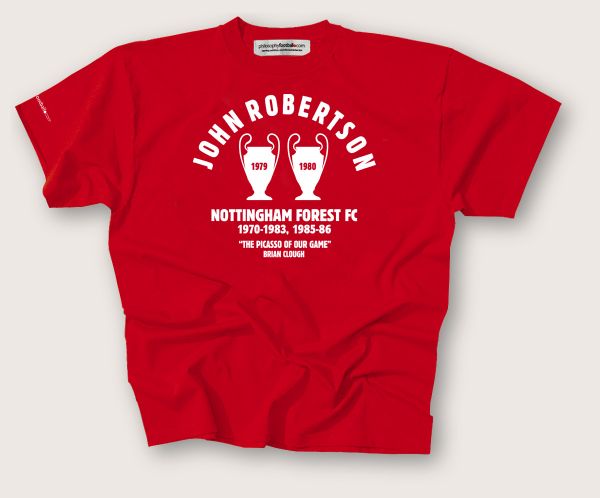
Mark Perryman is the co-founder of the self-styled 'sporting outfitters of intellectual distinction' AKA Philosophy Football
Thatcherism Today
04.10.25
Philosophy Football's Mark Perryman calls time on the forthcoming Thatcher Centenary

Margaret Thatcher's 13 October 2025 centenary is a moment to reflect on how she, or more accurately 'Thatcherism', so decisively shaped the 1980s. And for ever more too, the post-war consensus she deconstructed and to date never to return.
The Labour historian Jim Fyrth describes what framed this consensus that had previously so decisively shaped British society and economy 1945-79.
"A mixture of Socialist, Labour, Keynesian, Fabian/Liberal and anti-Fascist ideas that was strongly anti-establishment and anti-capitalist, and was hostile to those who were held responsible for poverty and unemployment and for appeasement of the Fascist dictators."
Wow! It was this combination that was the basis of Labour's 1945 strength, what Fyrth admiringly dubs a 'popular front of the mind' the plurality of influences and ideas, the breadth of support. And it is this which produced an historically unique moment:
" It looked as though Conservative supremacy in society might be quite overthrown and a new hegemony of the Left be established."
But despite the populist idealism of Aneurin Bevan 'We have been the dreamers, we have been the sufferers, and now we are the builders' any likelihood of a ' hegemony of the left' was replaced by the early 1950s, and thereafter by a consensus between right-wing Labour and progressive conservatism. Popularly known as 'Butskellism' fusing Hugh Gaitskell, Labour leader 1955-63. with Tory Cabinet Minister Rab Butler 1951-64. Better than what followed when another '-ism', Thatcherism, dismantled that consensus but by no means as good as it might have been.
Stuart Hall prefaced the entrenchment of Thatcherism that would commence with her leading the Tories' rout of Labour in the May 1979 General Election with an essay for the January 1979 edition of the magazine Marxism Today. It was this essay 'The Great Moving Right Show' that would spark a wide-ranging debate not only on Thatcherism but what Hall argued facilitated it, a deep-seated structural and ideological crisis of the left.
As Hall developed his description of the Thatcherite project it became more and more terrifying, but inspiring too. Terrifying in so far as what Thatcher was able to achieve, inflicting defeat after defeat on her opponents most spectacularly the miners' strike of 1984-85. Inspiring, in so far as what Labour, and the wider left, could achieve with a hegemonic project on the scale of Thatcherism.
Hall listed those elements required for a hegemonic project to succeed:
" The attempt to put together a new 'historical bloc'; new political configurations and 'philosophies': a profound restructuring of the state and the ideological discourses which construct the crisis and represent it as it is 'lived' as a practical reality; new programmes and policies, pointing to a new result, a new sort of 'settlement'."
Of course, none of this appeared in the Tories' manifesto nor in Thatcher's campaign speeches and broadcasts. And no I'm not suggesting that because they didn't appear on Blair's 1997 pledge cards nor in and amongst Starmer's 2024 missions this is the damning evidence required that 'The Great Moving Right Show' has never been superseded by 'The Great Moving Left Show' But read through Hall's list and ask yourself is this what Blair(ism) and Starmer(ism)'s politics amount to?
And if they don't is it enough when Labour achieves the kind of landslide victory Blair did in 1997 and Starmer in 2024? Hall's argument was that Thatcherism had all the makings of success, her utter destruction of a post-war consensus that had lasted since 1945. In contrast the complete failure of Blair, and Starmer, to replace Thatcherism/Neoliberalism. Helpfully Hall detailed what elements would be required for such a break:
" These do not 'emerge': they have to be constructed. Political and ideological work is required to disarticulate old formations, and to rework their elements into new configurations."
Blair's legacy, Starmer's prospects, should be judged precisely in how far they fulfil this task. For all the good, and there was a lot, that Blair did, and all the good that Starmer will do, which I entirely expect there will be, this surely is the least we can expect of Labour governments. But to use a now favourite word in Labour's lexicon 'change' without that construction, disarticulation and reworking, no new consensus will be established. What a waste.
Following the 1979 General Election, in his essay 'Thatcherism: The Impasse Broken?' the editor of Marxism Today,Martin Jacques, mapped out why the Thatcherite hegemony was as much a product of a crisis of what the 1945 Labour vision, 'Now Win the Peace', had turned into, as a victory of the right.
Jacques described this shift as from a project of transformation to an ever-increasing emphasis on modernisation, sounds still familiar? The newly elected Labour leader, Harold Wilson had prefaced this change in his speech to the 1963 Labour conference:
"In all our plans for the future, we are re-defining and we are re-stating our socialism in terms of the scientific revolution. But that revolution cannot become a reality unless we are prepared to make far-reaching changes in economic and social attitudes which permeate our whole system of society.
The Britain that is going to be forged in the white heat of this revolution will be no place for restrictive practices or for outdated methods on either side of industry."
Jacques set out what this produced in turn:
" The strategy of modernisation it sought to carry through - aimed at a major transformation of the economy and society - proved not only completely inadequate relative to the nature and scope of the problem but, crucially, it also involved a new kind of attack on the position of the unions and, more widely, the working class, that is on its own social base."
The effect wasn't immediate, Labour's 1945 election-winning vote share of 47.8% was still as high as 47.9% when Harold Wilson won in 1966, an impressive holding of the electoral ground. But after that the decline was non-stop, coming to a shuddering halt on 36.9% in 1979 (note Starmer's 'landslide' was an even lower Labour share of the vote, 33.7%.) Likewise, Labour membership reached a post-war high of 908,000 in 1950 but after 1964 fell every year to 676,000 in 1978. The current 2025 figure is under half that, 333,235.
The reason for the decline and Labour's defeat in 1979? Jacques argued:
" Labour has become identified with the increasing use of the state in an administrative, impersonal, bureaucratic and even authoritarian manner."
He described the implications as 'profound':
"The Labour Party for many people, especially young people, is no longer seen as an effective oppositional, anti-establishment force; on the contrary, for many it has become an establishment party, partially incorporated into the state structures....
... Inevitably, this has undermined the position of the Labour Party as a party, rooted in society, enjoying a popular activist base, and committed to reforming society."
The post-war consensus which Labour had founded in 1945 followed by Labour's 1960s flirtation with a technocratic modernism was ignominiously ended by the 1978-79 Winter of Discontent. An outpouring of angry strike action as layer after layer of low-paid workers resisted the poverty imposed on them by Labour's state-sanctioned programme of wage restraint. Be careful what you wish for? Sure, but own a crisis that was every bit Labour's making as Thatcher's windfall. Statism that was once the glorious shock of the 1945 new replaced by an alien, bureaucratic, inefficient state that was no match for the right to buy your own home, become a shareholder in an unfettered public utility, bring bright, shiny, new management practices to a failing NHS. This was modernisation, and then some. To which Labour had no effective answer because it had helped create the need for such drastic, if disastrous, action, in the first place. What a gift, the consequences we've been living with ever since. Time to wish Happy Birthday Maggie! Maggie! Maggie! With the inevitable Out! Out! Out!
Thatcher Centenary Steve Bell design exclusive to Philosophy Football and available as a mug, tea towel,T-shirt and framed print here.
Mark Perryman is the co-founder of Philosophy Football.
Top Ten Books to Understand Labour Conference
26.09.25
Philosophy Football's Mark Perryman selection makes sense of a party in trouble
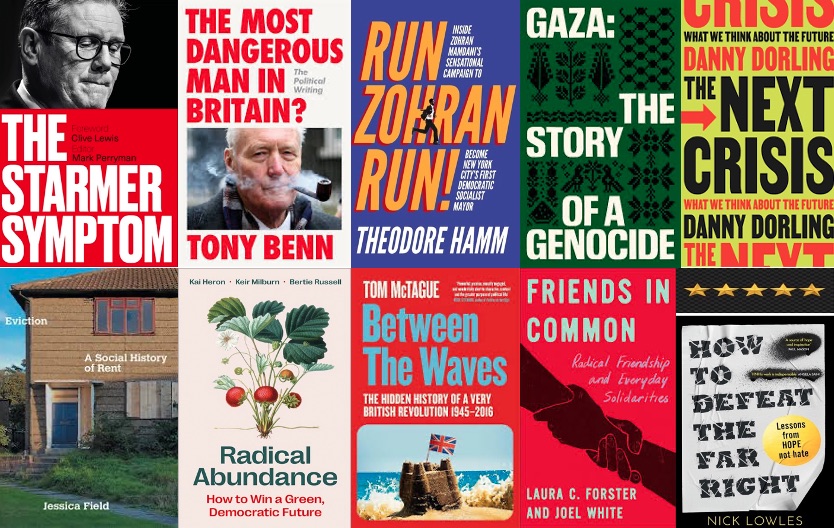
The 04.07.24 landslide seems like a lifetime ago in the lived experience of this Labour government and attendant party. A Prime Minister elected on a record-breaking low share of the vote, 33.7%. A victory secured by the split in the right's vote between the Conservatives and Reform UK. Further aided by the unwritten pact that meant Labour effectively withdrew from seats where the Liberal Democrats were best placed to oust the incumbent Tory MP, and where Labour best placed the Lib-Dems doing likewise.
Once victory secured however, what has been dubbed the 'loveless landslide' could, should, have been turned into an era to inspire and give hope. But nothing of the sort has appeared, instead Keir Starmer is achieving record lows in polls measuring favourability. Meanwhile Reform UK has such a big and consistent lead in the polls Nigel Farage as the next Prime Minister has moved from a nightmare to realistic possibility.
As Labour meets for its annual party conference how might we make sense of a party in such trouble? My selection finds the top ten books to help in this venture.
The Starmer Symptom : Mark Perryman
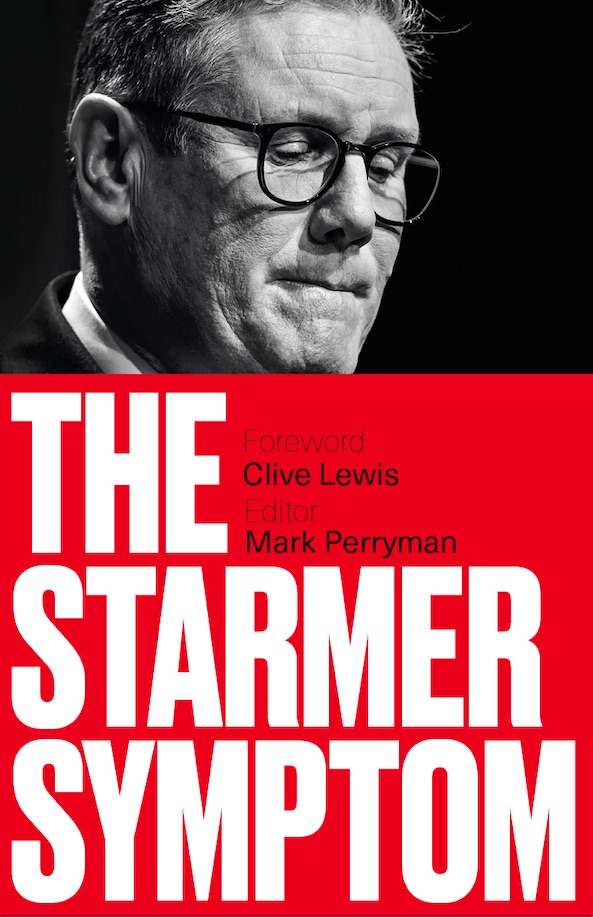
OK I have to declare an interest here ... Nevertheless, The Starmer Symptom written in the year since the landslide is the first book to account for how those twelve months have shaped Labour's prospects. This is a collection of essays, edited by me, with a foreword by Clive Lewis MP, the collective thoughts infinitely more incisive than anything I could have come up with on my own. Comprehensive too, mapping the 2024 vote, measuring the fallout for the parties, a critique of Labour's response to the key issues facing it in government, and an outline of the alternatives to a party in impasse.
The Starmer Symptom from here
The Most Dangerous Man in Britain? : Tony Benn
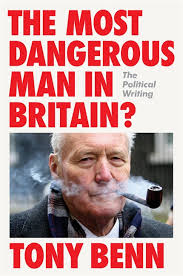
Labourism has a terrible habit of always looking backwards rather than forwards. But a modernisation so intent on appearing forward-looking at the expense of learning everything from the past is every bit as bad, if not worse. In the early to mid 1980s 'Bennism' was a hugely popular movement in and around the Labour Party, never dominant, its rise bitterly contested by the Labour Right it was nevertheless part and parcel of Labour, and a wider left. Benn however wasn't just a leader, a thinker too, this new collection of his political writings testament to that. Agree or disagree with Benn's thinking there are few Labour figures who have matched him since for his boldness and originality including the one figure from that Bennite left to lead the Labour Party, Jeremy Corbyn.
The Most Dangerous Man in Britain? from here
Run Zohran Run!: Theodore Hamm
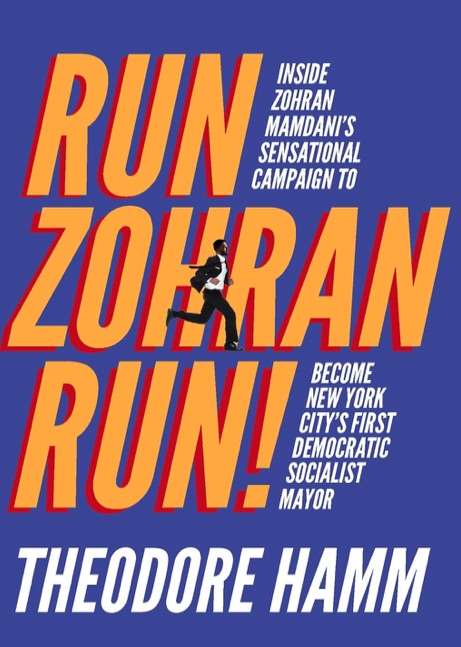
Looking for a sign of present-day hope? While the Green Party under Zack Polanski show all the signs of a party with the potential to repeat their successes winning inner city seats off Labour in Brighton andBristol and the civic-nationalism of the SNP and Plaid Cymru continue their revival those who have promised a left alternative to Labour, Jeremy Corbyn and Zarah Sultana offer only that well-worn experience of the internecine and the warfare. Hopeless? Theodore Hamm's book is a gripping account of how Zohran Mamdani defeated his party's machine from within to win the Democrat's nomination for November's New York Mayoral Election. If he proves victorious in the election itself an addition for Andy Burnham's bookshelf, and all who'd back him to win the Labour leadership.
Run Zohran Run! from here
Gaza The Story of a Genocide : Fatima Bhutto and Sonia Faleiro
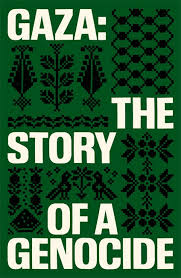
Beyond the looking-glass world of Westminster politics and the ups, or mainly downs, of Labour's poll ratings Gaza has provided the basis for a generational shift. In much the same way as Hungary in '56, Vietnam in 1968 and Iraq in 2003, Gaza since the murderous Hamas attack in 2023 followed by Israel's deadly assault on Gaza which is now internationally recognised as genocidal, is a conflict that has come to define the current era. 1956 had dire consequences for the Communist Party but was hardly an issue to affect Labour. Vietnam, despite the huge pressure to do so, Harold Wilson refused to send British troops. Iraq damaged Blair, deservedly so, yet his 1997 landslide recorded a huge 43.2% of the vote, which meant unlike Starmer he had a sufficient cushion to ride the declining support for Labour in 2001 and 2005 to victory. Fatima Bhutto and Sonia Faleiro's collection is a wide-range of cultural responses to Gaza a hugely imaginative breadth of anger, and hope. A testimony to a shift that a tin-eared Starmer seems almost entirely oblivious of and Labour will pay the price for.
Gaza The Story of a Genocide from here
The Next Crisis - What We Think About the Future : Danny Dorling
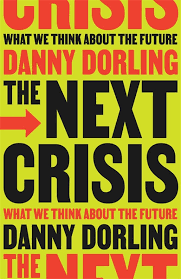
The latest from the extraordinarily prolific Danny Dorling, and like all his other writings this book doesn't disappoint, anything but. Combining empirical analysis with originality of insight is Danny's style, together they make for a convincing argument, but does he have the ear of a government minister, or two? He should! Across key issues, including the cost of living, immigration and the climate crisis, the book digests polling data to uncover a range of universally powerful anxieties that don't fit either the conventional picture we have of voters or the limited range of responses politicians choose their responses from. An essential read to map out any kind of Labour recovery.
The Next Crisis from here
Eviction - A Social History of Rent : Jessica Field

For many voters the number one issue will be housing. The lack of, rising cost to rent, treatment by landlords. Labour's response is build, build, build! Yet almost entirely absent from that project is the issue of ownership. A party more identified than any other council housing, where ownership lies with the local state instead of the weasel word language of 'affordable housing' and 'social ownership.' Jessica Field mixes the historical with the personal to document the central social conflict in contemporary Britain, tenant vs landlord. Council housing was never perfect but it remains the only way to inject a democratisation founded on accountability into that relationship because it isn't founded on the profit motive but a social objective. This is the book on which to found such a switch.
Eviction from here
Radical Abundance - How To Win a Green Democratic Future : Kai Heron, Keir Milburn and Bertie Russell
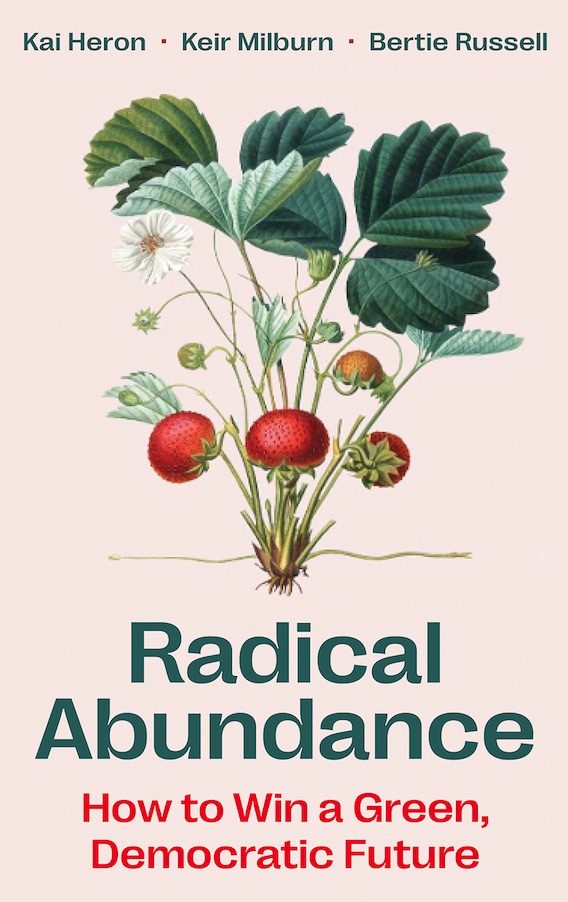
Ed Miliband is one of the Cabinet Ministers who it could be said doesn't fit the Starmerite yes-man, or yes-woman, mould. He has made arguments around energy and climate change very much his own as the 'Green New Deal' morphed into 'Great British Energy'. But despite those best efforts none of this can amount to much so long as the government's one word response to all matters economic is, growth. And never mind the consequences for, the climate. 'Radical Abundance' is the answer the authors of this wonderfully engrossing book offer. Not hair-shirted socialism but a flourishing of pleasurable possibility via the democratic control of the green means. Framed by actually-existing examples of how, this is a handbook for a new economy, and society.
Radical Abundance from here
Between the Waves - The Hidden History of a Very British Revolution 1945-2016 : Tom McTague
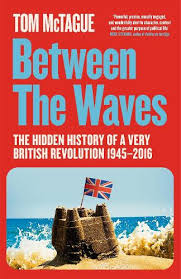
Keir Starmer was only elected as an MP in 2015, prior to that with his responsibilities as Director of Public Prosecutions any involvement in the Labour Party would have been minimal. Despite this, and not being a 'Corbynite' he was trusted by Jeremy Corbyn post the 2016 Referendum with steering Labour's response to Brexit. A 'steer' which he successfully directed in the direction of Remain, to be enabled by a second referendum. Alongside positioning himself as the Corbyn continuity candidate it was this which helped him win the 2020 Labour Leadership Election. The break with the Corbynite pledges has been widely noticed. Much less so the breach with Remain, a far more awkward switch for many of his supporters. Tom McTague's book is a brilliantly-written explanation of why despite Keir Starmer's worst efforts, and the 'Lexit brigade', this is an issue that won't disappear, nor should it. A history of a present the Prime Minister would prefer didn't exist.
Between the Waves from here
Friends in Common - Radical Friendship and Everyday Solidarities : Laura C. Foster and Joel White
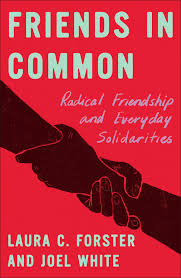
Freed from the limits of Labourism, outside the conference hall stage-managed politicking, in nooks and crannies of civil society there are disparate forces seeking to re-imagine how we 'do' politics. The late 1970s book Beyond the Fragments: Feminism and the Making of Socialism remains the key text for those engaged in this almighty endeavour, it is superbly fitting that one of the book's authors, Lynne Segal, is quoted on the back cover welcoming this latest addition to the literature towards that end. How can friendships framed by political co-operation become the foundation for ever-expanding and dynamically inclusive communities? And in the process reinventing an old value 'solidarity.' Friends in Common, a most welcome handbook of audacious ideas.
Friends in Common from here
FIVE STAR CHOICE
How to Defeat the Far Right : Nick Lowles
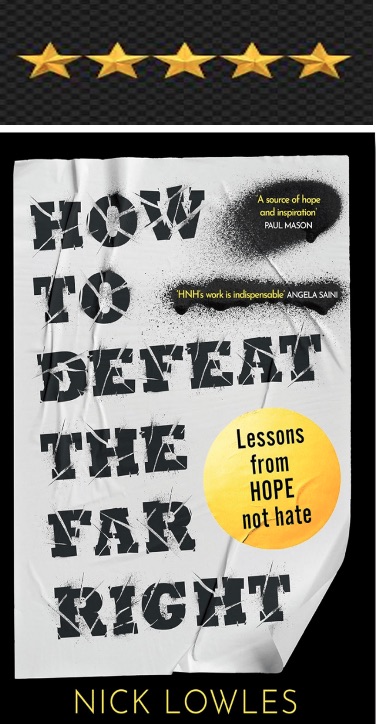
Whatever happens at Labour conference, however good the speeches, wherever the votes end up (not that these have any impact on Labour policy whatsoever nowadays) one thing is certain. Reform UK will still lead the opinion polls, Nigel Farage will remain a credible contender to lead his party to winning the next General Election, and 'Tommy Robinson' will continue to whip up a tidal wave of popular racism.
Nick Lowles has form in stopping all of this. A combination of undercover work exposing the murderous intent of neo-nazi grouplets, the huge effort to defeat Nick Griffin's credible effort to win Barking in the 2010 General Election, research, surveys and community-based initiatives to challenge the far right in the localities they would seek to lead. 'Hope not Hate' a campaign like no other, and all the better for that. Free of the placard-waving and name-calling in order to make a difference. This book should have been given to every Labour conference delegate, Keir give up his party leader's slot for Nick to address conference, campaign workshops replace the rituals of resolutionary labourism. For this is an emergency.
In the absence of any of that grab yourself a copy, it might just be our last chance to prevent a nightmare becoming a reality.
How to Defeat the Far Right from here
Special Offer 30% off The Starmer Symptom quote coupon code Starmer 30 from here
Note No links in this review are to Amazon when purchasing, if you can, avoid giving money to billionaire tax-dodgers.
Mark Perryman is the co-founder of the self-styled 'sporting outfitters of intellectual distinction' aka Philosophy Football
The Meaning of Mo Salah, UEFA and Gaza
16.08.25
Philosophy Football's Mark Perryman welcomes a footballer exposing the truth about Gaza

Following the death of Palestinian footballer Suleiman al-Obeid UEFA tweeted sorrowfully:
“Farewell to Suleiman al-Obeid, the ‘Palestinian Pelé. A talent who gave hope to countless children, even in the darkest of times."
Fair enough, nice of them, many must have thought. Not Mo Salah who with three questions exposed the moral dithering over Gaza not only in football but wider across popular culture, society and politics.
“Can you tell us how he died, where, and why?”
The answers were easy enough to find, the fact UEFA hadn't provided them tells us so very much.
He died, like tens of thousands of others as a result of an Israeli armed assault which was purposefully and lethally indiscriminate. We can argue the toss over whether or not to call this 'genocidal' what is without question is these killings are by no stretch of imagination, or Israeli government denials, accidental. Of course, avoidable tragedies occur in any war, the entire history of warfare is full to overflowing with human tragedy. But such killings on such a scale reveal what is clearly Israeli military policy.
What was Suleiman doing to put himself in such a precarious position? Queuing like thousands of other Palestinians for humanitarian aid. Even being the 'Palestinian Pelé' didn't mean he and his family could avoid such a necessity if they weren't to starve. These aid distribution points are easy enough to identify and ensure free of the gunfire, and worse, all around them. There is a long tradition, originated by the Red Cross, of such sanctuaries in war. Not in Gaza, not from the excesses of the Israeli military.
OK in a tweet UEFA might not have been able to explain all of this. But simply to bid Suleiman 'farewell' tells us plenty, and none to UEFA's credit.
To date authoritative sources have recorded over 60,000 Palestinian deaths at the hands of Israel, including the Palestine FA report over 400 footballers.
The 'darkest of times' well put, but without anything resembling the reason why, the sentiment becomes entirely meaningless.
And Israel has faced no consequences for its actions from FIFA. 'Keep Politics out of Sport' is the well-worn mantra but of course sport, especially international sport, is unavoidably political. Whatever the country the 'national team' represents the nation on a global stage and politics via national identity is entirely indivisible from that. Eric Hobsbawm's words " A nation of millions seems more real as a team of eleven named people" is generally used as a positive, but it is equally applicable as a negative. A point often missed is Hobsbawm wrote those words recounting his experience as a Jewish schoolboy following football during the rise of the Nazis in Austria before he escaped as a refugee. Sport not political? When England played Germany in the 1930s the team were instructed by the FA to give the Nazi salute when they lined up for the anthems. Sport not political? When Tottenham Hotspur hosted England v Germany at White Hart Lane in 1935 the club flew the swastika from the flag pole on the roof of the much-loved East Stand.
Sport has always been used, sometimes more subtly, in such ways. And on occasion FIFA has in turn used its status as football's world governing body to police this too. In 1961 South Africa was banned from international football because of the ruthlessly racist state policy of apartheid. A ban that was dropped in 1963 when the last English President of FIFA, Sir Stanley Rous, following his negotiation that South Africa would field all-white and all-black teams at alternating World Cups. Yes, really. A gross insensitivity to global opinion, particularly in Africa. Rous out-voted, South Africa was suspended in 1965. Two years later in an unprecedented move Rous was deposed, mainly due to African countries' votes, South Africa expelled, a suspension lasted 25 years until the ending of Apartheid. An ending marked by the country's triumphant hosting of World Cup 2010. A happy ending, of sorts, and intensely political.
In 1992 the bitter ethnic conflicts, eventually descending into all-out wars, that accompanied the break-up of Yugoslavia led to the country, despite topping their qualifying group, being suspended on the eve of Euro 92. With just ten days to prepare lucky old Denmark replaced them, going on to win the tournament.Today all the Balkan nations compete independently in UEFA and FIFA competitions, Kosovo the most recent to do so.
Following their hosting of World Cup 2018 Russia after invading Ukraine was banned from both the 2022 and 2026 World Cups. England, Poland and Sweden pre-empted this decision, unilaterally declaring they would refuse to play Russia. The ban continues while both the Ukrainian national team and club teams, despite being mostly in exile, continue to play in both UEFA and FIFA competitions, providing a vital focus of hope and identity for Ukrainians in their war-torn country and as refugees across the world.
Which leaves another question concerning UEFA's tweet. Why is Israel a member of football's European confederation, unlike its neighbours Jordan, Syria, Lebanon and Palestine all members of the Asian confederation (Egypt is a member of the African confederation). A question I've never once heard asked in any football commentary, or raised in a match report, of an Israeli club or the National Team competing in European competitions or World Cup Qualifying. Not once, ever, let alone since the current conflict.
The Israeli FA, the successor organisation to the Palestinian FA which included both Jewish and Arab club sides, joined the Asian Confederation in 1956. And their membership proved successful, Israel was runners-up in the Asian Cup of 1956 and 1960, hosted the tournament in 1964 which they also won. But off the pitch Israel was a site of major conflicts, most notably the 1967 Six-Day War and 1973 Yom Kippur War. As a result, Arab and predominantly Muslim nations more and more refused to play Israel. In 1967 Israel was summarily expelled from the Asian Confederation.
UEFA admitted the Israel National team in 1991, Israeli club sides in 1992 and as a full member in 1994. This is despite Israel not being in any sense a European nation. It was a decision with absolutely nothing to do with events on the pitch and everything to do with events off it. This is an entirely political decision, which neither UEFA nor the attendant football media seem at all willing to admit.
So, should we despair, give up all hope? No, not ever. At the 1972 Olympics this conflict collided with sport in the most tragic of manners. Israeli athletes taken hostage by the Palestinian terrorist group Black September. In the ensuing shoot-out most of the athletes lost their lives, either killed by Black September or in the crossfire with the police sharpshooters. 40 years later Palestine featured again at the Olympics, at London 2012 Palestinian athletes marching for the first time in an Olympic Opening Ceremony behind the Palestinian Flag. For good or bad, sport is always political, given the will the outcomes can be positive not negative. Mo Salah shows us how to shift the balance now, when we need to so much, from the latter to the former. Hope 1 Despair 0.
Philosophy Football's Suleiman al-Obeid & Mohamed Salah T-shirt is available here.
Mark Perryman is the co-founder of the self-styled 'sporting outfitters of intellectual distinction' aka Philosophy Football.
Top Ten Beach Reads to mix sun, sand and subversion
08.08.25
Philosophy Football's Mark Perryman eclectic summertime reading
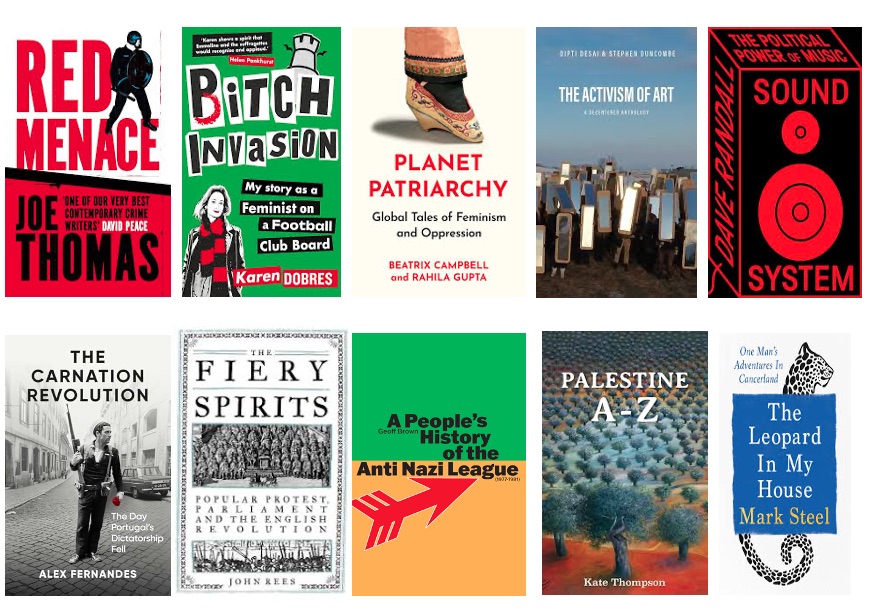
The summer, a time for the beach, sunshine, sunglasses and in between whatever takes our marine fancy for a holiday read. A bit of escapism, something for the fast-approaching start of the new season, a challenge to prejudices old, and new, words to inform and inspire as tools of subversion. My selection aims to provide all of this, and more.

Red Menace: Joe Thomas
Joe Thomas was a beach read discovery last summer via White Riot a novel that brilliantly weaved its way around the late 1970s growth of the National Front, a resistance led spectacularly by the Anti Nazi League and Rock against Racism. And then into the early 1980s featuring the rising number of young black men dying in police custody. A political thriller with a left wing bent, the added twist being it is written from the perspective of a spycop. Oh my! Red Menace the second in a promised trilogy, this time taking us from the Broadwater Farm riots in Tottenham to the Wapping Picket Line. I'm not sure there's ever been novels written with such political insight and rollicking plot lines. A writer top of my pile, second summer running.
Red Menace from here
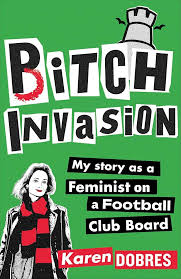
Pitch Invasion: Karen Dobres
Karen Dobres is the face, brain and unstoppable energy behind the reinvention of non-league Lewes FC as the global trailblazing Equality FC. To declare an interest, I'm a supporter of Lewes FC and don't always entirely agree with the detail of the direction Karen would take the club, or indeed football, in. But that's not the point. It's the direction that is right, arguing over the detail shouldn't distract from that. Where the two collide is the almost unremarked upon dominance of women's football by the same 'big' clubs as the men's game. And in the process the almost complete extinction of autonomous women's clubs of the sort of the glorious Doncaster Belles. Pitch Invasion provides the kind of rounded view that if applied could resist both these unwelcome developments.
Pitch Invasion from here
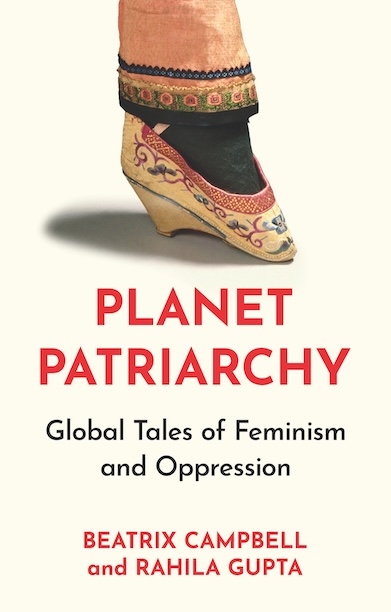
Planet Patriarchy: Beatrix Campbell and Rahila Gupta
Long-standing feminists, writer Beatrix Campbell and Chair of Southall Black Sisters Rahila Gupta deliver an outstanding and up-to-date analysis of patriarchy, worldwide. Much has changed in and around feminism since the heady days of the 1970s 'second wave'. But as this politucally spiky duo reveal much hasn't. Their survey of the inequality and discrimination women face globally proves that but also the enduring commitment to change all of this of its foe, women's liberation. A movement founded on sisterhood, solidarity and resistance. The sheer variety of expressions of this mix the authors uncover quite breathtaking, the scale of what societies produce to deny these women liberation staggering. A potent combination for a powerful read.
Planet Patriarchy from here
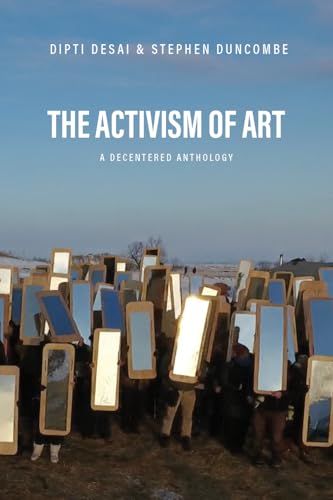
The Activism of Art: Dipti Desai and Stephen Duncombe
Stephen Duncombe is one of those rare writers who combines the study of how culture shapes politics with an accessible way of describing how. The often indecipherable language of cultural studies academics stripped bare, to produce a new common sense. In his latest book, co-authored with Dipti Desai, these two wonderfully gifted writers chronicle the intersections between art and politics that the sheer scale of the dullness of the conventional versions of 'doing politics' from the parliamentary to the protest ignores, at their and our peril. As self-styled 'sporting outfitters of intellectual distinction' something Philosophy Football has sought to deconstruct from our very beginnings. In this regard, a book not only to read but also to practice.
The Activism of Art from here
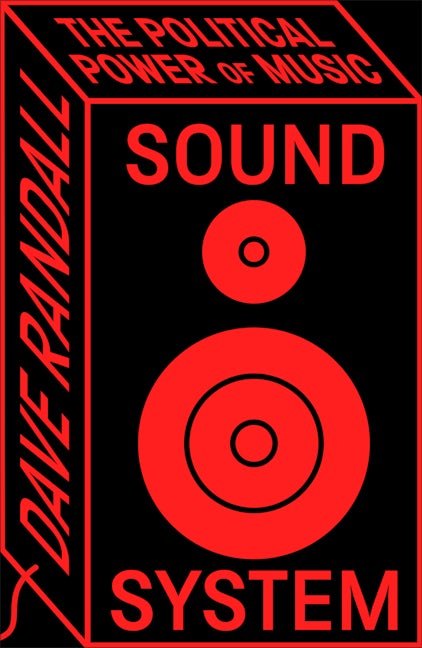
Sound System: Dave Randall
If there's one space where the fusion of the cultural and the political has revealed the popular potential of the mix it is music. Dave Randall is both a professional musician and a skilled interpreter of his mix. In Sound System, sub-titled 'the political power of music' he has written an intellectual how-to guide for a movement of change in which a soundtrack is every bit as vital as the more customary baggage of worthy texts. Historical, international and practical, the three ingredients of not only this very fine book but the reasons for the huge impact of the current most obvious example of what the book might aspire to, Kneecap.
Sound System from here

The Carnation Revolution: Alex Fernandes
The kind of political fusions in their different ways Dipti Desai, Stephen Duncombe and Dave Randall describe take their most vibrant forms in revolutionary moments. The trouble is despite the worst efforts of Saturday morning Socialist Worker paper-sellers those moments for most of us are either few and far between, or faraway, or both. Yet for those heading to the Algarve coast for the beaches and sunshine, or Lisbon for a summer city break Portugal was the setting of a revolution just a generation ago. The Carnation Revolution by Alex Fernandes records in thrilling detail how in 1974 Europe's last remaining fascist regime was brought to an end, daring deeds, the courage of crowds, the rebellion of young army officers. Those were the days, a regime and its empire ended by R-E-V-O-L-U-T-I-ON.
The Carnation Revolution from here
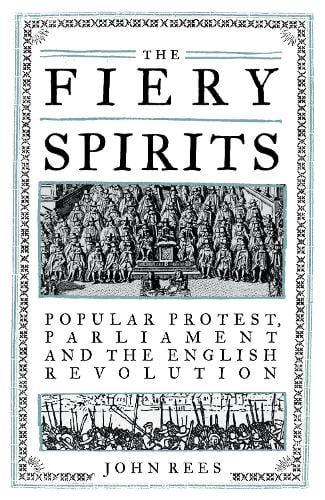
The Fiery Spirits Popular Protest, Parliament and the English Revolution: John Rees
Detailing the leadership and ideas that would lead to the deposing of King Charles (no not that one) and his eventual execution in 1649 (ditto) The Fiery Spirits is a hugely readable account in the tradition of a 'people's history' of Christopher Hill and others. This was English republicanism on the march, at war with all things regal. Yet as John Rees details this was a movement that knew it needed to make allies, to use the inspiration of their republican, revolutionary ideals to inspire others. No, despite the execution, it didn't end the monarchy but it did strip them of almost all their powers, if not riches. Which left me asking after reading this very fine book, time (minus the execution) to finish the job?
The Fiery Spirits from here
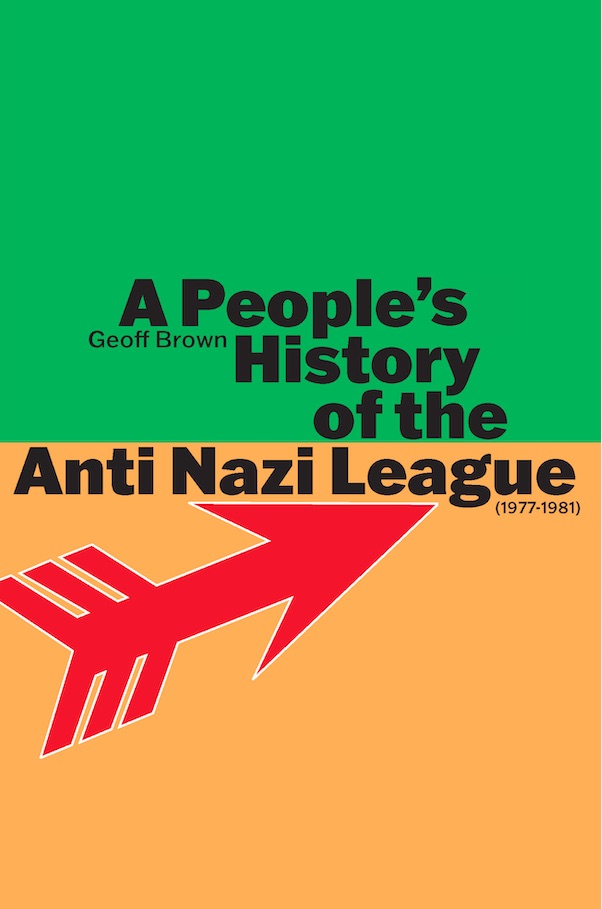
A People's History of the Anti Nazi League (1977-1981): Geoff Brown
If English revolutions are in historically short supply, the same, thankfully, cannot be said of mass movements on these shores that effect social change. In the 1930s the Popular Front against Moseley and his black-shirted British Union of Fascists, the International Brigades who went to Spain to defend the Republic against Franco's fascists. In the 1950s the rise of CND, in the 1960s the anti Vietnam War movement and in the 1970s to stop Apartheid South Africa via stopping their cricket and rugby tours. The Anti Nazi League absolutely stands in this tradition as detailed by Geoff Brown in his 'people's history'. Unselfishly galvanised by the organisational skills of the Socialist Workers Party the ANL worked because it was unimaginably bigger and broader than the self-styled 'revolutionary left'. And everyone could be a part of it, from wearing a 'Scholl Kids Against the Nazis' badge, pogoing at a Rock against Racism gig, dishing out leaflets, going on marches and if push came to shove stopping the fascists, the National Front, in their tracks. A rich and plural variety that not only makes a very good read but powerfully illustrates all kinds of lessons for how we resist today the rise of the populist right and their attendant far right too.
A People's History of the Anti Nazi League from here
Palestine A-Z: Kate Thompson
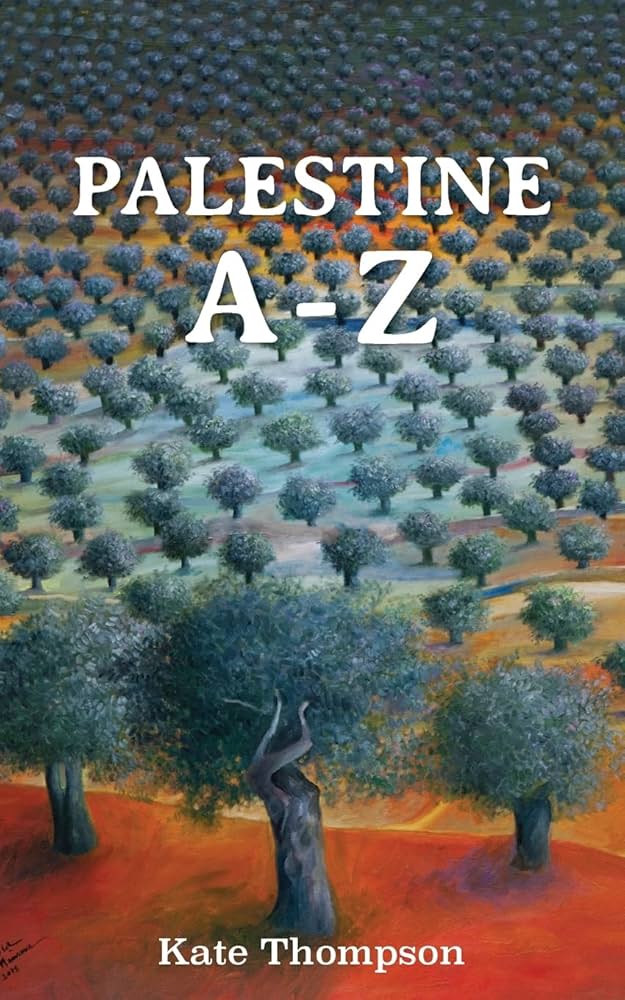
The Anti Nazi League and Rock Against Racism were the movements that provided a generational moment in the late 1970s the Miners Strike did the same 1984-85. The Iraq War 2001- 2005, the student tuition fees protests of 2010, #BlackLivesMatter and #MeToo (fill the gaps with your own memories and experiences) and now without any doubt Gaza. This last has by no means ended and the abject betrayal of Palestine by the political and wider establishment, most notoriously by this Labour government, has created a cleavage which (quite rightly) won't be closed in a hurry. But this cannot be an excuse for narrowing the cause to the fully signed-up left. Palestine is absolutely not a left/right issue the cause crosses all such divisions, it must appeal, not only to those who will march and those who don't. The potential is huge and broad yet nowhere near reached. Kate Thompson's delightful A-Z will convince anyone why it needs to, if not, how?
Palestine A-Z from here
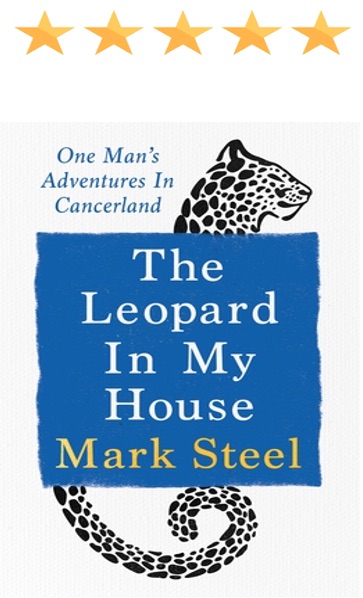
FIVE STAR CHOICE
The Leopard In My House One Man's Adventure in Cancerland: Mark Steel
My 'five star' choice for this summer's top beach read is a comically inspirational real life read out of real-life potential disaster, cancer. No, it doesn't sound like quite the book for long-awaited summer hols but in the hands of the one and only Mark Steel anything is possible. Cancer touches the lives of all sorts, ages and sizes, it requires all the skills the NHS can provide to detect and diagnose. The treatment often lengthy, sometimes intrusive. Most cancers can be moderated, few extinguished entirely, some, too many, prove lethal. Men on the whole aren't very good talking about much, or indeed, any of this. Mark Steel is, and provides bucketfuls of laughs along the (happy ending alert) road to recovery. An absolutely superb beach read. Five gold stars fully deserved.
The Leopard In My House from here
Note No links in this review are to Amazon, if you can avoid buying books from tax-dodging billionaires please do so.
Mark Perryman is the co-founder of Philosophy Football, his new book The Starmer Symptom is published by Pluto in August, here
When The Lionesses Win What Changes?
02.08.25
Mark Perryman from Philosophy Football measures the impact of England Women's Euro 2025 victory

The 2025 sporting summer will forever be remembered for three and a bit weeks in Switzerland and England winning the Euros. Checks notes, the Women's Euros. A mere decade ago when the Lionesses made it to the World Cup semi-final, losing to Japan, was the first breakthrough. One which scarcely anybody had expected, it provoked ripples of interest. But nothing compared to 2025. It has been a slow but steady growth of interest ever since, which detonated three years ago with the Euro 2022 victory and if anything has been even more explosive this time around.
The miserable men who loudly decry all this as not 'proper football' remain a vocal minority, but they are precisely that, loud but marginal. Never mind Wimbledon, Chelsea's World Club Cup, the Lions, the Test series against India this sporting summer belongs unquestionably to the Lionesses. And that's one huge change, for the better.
The best thirteen words ever written on Englishness were provided by the historian Eric Hobsbawm " The imagined community seems more real as a team of eleven named people." England is a nation which doesn't even have a National Anthem to call our own and a national day, St George's Day, which year-in-year-out passes by unnoticed dwarfed by a Guinness-driven night out for that other Saint ,from across the Irish sea. All this changes for a Euro or World Cup tournament when Hobsbawm's 'imagined community' is wrapped in the St George's Cross. Except this was always previously for a team of eleven named men. Not anymore, the Lionesses and their support in turn reshaping this summertime version of a popular Englishness.
As I've chronicled elsewhere it was always something of a stereotype to picture all England fans as xenophobes, racists, far right. And the brutish expressions of football Englishness, arms out, 'Ten German Bombers', beered up, ready for a fight, a minority too. But that's not to say this ugly mix doesn't exist. Compare and contrast the morning of the Euro 2021 final to this summer. A pissed-up fan starts proceedings off in Leicester Square with a flare stuffed up his arse, before promptly lighting it. And it's all downhill from there. His flare now safely extinguished, even if his backside is feeling a tad warmed up, joins thousands of others making their way to Wembley Way. Their mission? Ticketless, to battle with police and security to force their way into the Final. Official reports estimate some 5,000 succeeded. It's hardly essentialist to point out these were all men, nothing remotely of this sort occurred at the Women's Euros, 2022 or 2025. Does that mean this popular Englishness has been entirely transformed by the Lionesses' success. No, of course not, but nor is it the same as what it had been.
A signifier? On the eve of the vital Group match which if England lost they'd be out the, Lionesses captain, Leah Wiliamson, was asked how she'd tackle her partner, the main Dutch goalscoring threat, Viviane Miedema. A question never had to be asked of Terry Buthcer of bloodstained head bandage fame or Stuart 'Psycho' Pearce. But the mental toughness demanded of Leah in these circumsances was every bit as heroic as these two England titans provided. Miedema? Leah led the back line, Viviane didn't get a look in, 4-0 to the England, job done.
These are changes of mood and attitude, changes 'from below' and wiyh an impact on a mass scale. However change isn't a simple process, principally because of the forces that seek to determine what can and can't be changed. The business that football has become does its best to eliminate the kind of risky endeavour that depends on the kind of last-minute equalisers and penalty shoot-outs that shaped the enormous impact of the Lionesses this summer. And such risk aversion is central to domestic women's football. No club comes anywhere close to challenging the absolute dominance of Chelsea, Arsenal and Manchester City Women. And spot the difference with men's football. Liverpool the only one missing of the Premier League's dominant quartet. But in men's football there is the odd exception, Leicester most famously, Nottingham Forest so close last season, the multibillion petro-dollars Newcastle can rely on getting them there or thereabouts. In women's football the triumvirate appear even more impregnable that the men's 'big four.' But in men's football there's also the chance of a cup upset, a giant-killing, Crystal Palace lifting the cup. Women's football has even managed to eliminate this flicker of hope, the cups almost always ending up with one or other of the 'big three'. I follow non-league Lewes FC, mainly the men's team. But my best ever moment I've had at our much-loved ground, The Dripping Pan, was when Lewes Women made it into the FA Cup Quarter-Finals to face Manchester United. United dominated, as expected, 2-0 up and then ... I saw something I thought I'd never witness, a Lewes player chipped England's first choice goalie. Never mind the gender this was historic. Mary Earps, England hero of Euro 2022, beaten. Of course, United then brought on another England international, Nikita Parris, to finish the job 3-1 but that moment was unforgettable.
The big three hegemony is rarely rattled. And it gets worse, 11 out of the 12 Women's Super League clubs are the sister clubs of Men's Premier League Clubs. The one exception? London City Lionesses, owned by an American billionairess. The Women's Super League Two (AKA, the Championship)? Same pattern, sister clubs of Premier League and Championship clubs, sole exception Durham. The modernisation of women's football has all but extinguished autonomous women's football clubs at anything resembling elite level, with just a handful reaching the Women's National League North and South (AKA League One) and none coming close to being promoted.
In 1990 All Played Out by Pete Davies was published. A runaway best seller telling the story of England's Italia 90 campaign that marked the birth of what became known as 'modern football'. Pete's book second only in importance and impact to Nick Hornby's Fever Pitch. After that Pete could choose whatever subject he wanted for his next book, publisher's advance and support guaranteed. He chose, women's football. Or more specifically the Doncaster Belles. I've read an awful lot of football books I Lost My Heart the Belles is by some considerable distance the best. Prior to the formation of the first women's national league in 1991 the Belles won their regional league every season from 1976 to 1991. Then the National League for its first two seasons as league and cup doubles, having already won the FA Cup previously four times. The club was founded by Sheila Stocks and fellow women who sold half-time lottery tickets at Doncaster Rovers home matches. Sheila played for the club for 25 years. In 2003 The FA created the first women's professional league and effectively forced independent women' clubs to merge with professional mens' clubs. The Doncaster Belles taken over by Doncaster Rovers, a club whose trophy cabinet was more or less bare compared to the Belles'. Autonomy, self-organisation was a founding principle of the women's liberation movement. It is hardly 'political correctness gone mad' to observe that in the dash for growth women's football clubs subsumed into men's has lost the kind of distinctiveness the Doncaster Belles and countless other clubs like them had.
This dash for growth driven by the Football Association and their support for the women's game, having previously presided over a 50 year ban on women playing matches on any FA-affiliated club pitches 1921-1971, is of course only to be welcomed. But there is a danger lurking too. This growth is driven first and foremost by the success of the Lionesses, and in particular winning Euro 2022. The men' game had a similar breakthrough after Italia 90 when the success of the England team reaching the World Cup semi, and the dramatic ending, out on penalties to West Germany, reached a huge audience. ' New fans' escaping from the years of domestic hooliganism, English club sides banned from European competition, and the combination of decaying grounds and poor policing that led to the Bradford Fire Disaster and Hillsborough. So, what did the FA do? Sold off the old First Division' to be privately run as The Premier League. The FA in this regard is unique, a governing body effectively ceding control over the elite end of their sport. And now the self-same has happened to the women's top two divisions too. All is fine now but as the club game grows the concern must be that the divisions will enlarge, more and more fixtures, pre-season tours added, release periods for the Lionesses to prepare for, and recover from, tournaments, shortened. The primacy of the England team undermined. Yet it is the Lionesses' success more than any other single factor that has driven the growth of the women's club football.
The FA basking in the success of Euro 2025 should be careful what they wish for. The same warning signs should be applied to UEFA, and FIFA. Euro 2025 was a glorious tournament both on and off the pitch. It worked because 16 teams mean just about every group stage match counts, the turnaround between group stages and knockout rounds long enough for players' recovery, short enough to maintain attention span.16 teams ideal for a country the size of Switzerland to host, their first major tournament since World Cup 1954. A single host stamping its identity on the competition, in the most gloriously nicest possible way. None of the above applies to the men's World Cup 2026, three hosts - USA, Mexico, Canada, 48 teams spread across them, innumerable matches of little or no consequence.16 just right for the Women's Euros, 32 arguably already too many for the Women's World Cup. Bigger isn't always better.
The most immediate change however the Lionesses are expected to achieve is to 'inspire'. An ambition always linked to participation. An expectation endlessly repeated by the massed ranks of the great and the good from Royals to politicians, sports administrators, and the players unsurprisingly joining in too. Sadly, this is myth-making on an epic scale. The 2012 London Olympics made the self-same claim on the biggest scale of all. After a brief spurt year on year participation in sport has fallen ever since. Every single piece of evidence proves that elite sporting success has next to zero impact on participation. Competitive team sport is the worst possible model for boosting participation. Not good enough to be picked for the team, just doing it, done, from the earliest age. If watching a game from the sofa or in the pub counts as participation, OK. Much more of anything else, forget it. To achieve anything remotely resembling connecting inspiration to participation means entirely rethinking the latter. Investing heavily in beginner-focussed coaching. It's the hardest coaching job of all to turn non-participants into participants, coaching elite athletes hungry for success is sublimely easy in comparison.To transform joining in football from a talent contest which most will inevitably fail into bursts of fun for all girls and women, young, old and in-between. Combining imagination and positivity, we might call it, 'soccerobics' mixing ball games with fitness for fun, from the very young to those old enough to think past it. And in the process the next time the Lionesses turn out, feeling part of their wider community.
When the Lionesses win what changes ? We can only answer that question when we rethink the meaning of 'change'.
Philosophy Football's Lionesses Euro 2025 Champions T-shirt is available from here
Mark Perryman is the co-founder of the self-styled 'sporting outfitters of intellectual distinction' AKA Philosophy Football
And then there were two
01.03.25
Mark Perryman writes of Rick Buckler and the legacy of The Jam as a three-piece he leaves behind

There's not many bands that are a three-piece. The classic line-up a drummer with a frontline of vocalist, lead and bass guitarists, or sometimes, as with The Clash three guitarists one, in their case Joe Strummer, also on lead vocals duty. Fancy dan additions might include keyboards, brass section, backing vocals.
The Jam were different. Rick Buckler on drums, Bruce Foxton playing bass, Paul Weller lead guitar and vocals. They lasted together a mere five years, 1977-82 but for a generation born into music-loving by the punk era Rick, Bruce and Paul have been part of our soundtrack of musical memories ever since.
With the terrible February news that Rick after a short illness has passed away now there are two. In a wonderful tweet Guardian journalist and huge Jam fan John Harris summed up what him and his fellow fans have lost:
"Rick Buckler did what the best drummers do: served the song, and put his mark on all of them. Examples abound, but here are a few: In The City, All Around The World, the peerless live version of It's Too Bad, Thick As Thieves, Eton Rifles, Scrape Away, Beat Surrender..."
Rick was no Keith Moon, Cosy Powell or Ringo Starr, he was almost as invisible off stage as he was on it, tucked behind his drum kit. But the pounding percussive rhythm to the songs John picked out, and many more, would be every part of what we hummed along to, shouted out the choruses and made our dance moves for as Bruce's hypnotic bass lines and Paul's vocals painting musical and verbal pictures of our imagination.
The Jam, despite Paul Weller's very obvious much higher profile, when they were together, when he left to form The Style Council, and his very successful solo career ever since, were and always will be a threesome.
The split in 1982 left Bruce and Rick feeling more sad and disappointed than bitter and twisted yet a reunion had never been mooted nevertheless there was a genuine warmth from Paul on hearing the news of Rick's sudden death for what his drumming had provided for The Jam.
"From our rudimentary beginnings the band evolved into the powerful force that it became. Rick's evolution as a drummer, was such a vital part of that."
Looking back almost 50 years, goodness if that doesn't make those of us who were there at the start feel old, my first live sighting of The Jam was their Friday night headline slot at Reading Festival 1978 , The Jam although always bracketed with Punk were testament to this moment taking multiple forms. And in large part this was its strength.
That Reading Festival of my fond Jam memories is mixed with the same weekend of Sham 69, poor Jimmy Pursey forced once more to evict that section of his fanbase that were National Front or worse from the stage . Sham and Motorhead fans raining down on each other the cans and bottles thrown. Yet Sham 69 and The Jam both labelled as 'punk'.
From its very beginnings, another early memory, 1976 and transfixed by The Sex Pistols' Johnny Rotten and Steve Jones with various members of 'The Bromley Contingent' (including if I remember correctly Siouxsie Sioux) heaping expletives on presenter Bill Grundy live on his early evening TV show Today. I roared them on from the family sofa. Away in the kitchen, my parents fortunately unaware of my antics.
The anarchic Sex Pistols also flirted with Nazi chic, as did the otherwise effortlessly stylish Siouxsie Sioux. The Clash and The Tom Robinson Band wore their politics on stage and off. It is almost impossible to explain the huge statement made when Tom blasted out ' Sing if You're Glad to be Gay' as a punk anthem. Sham 69 and the Angelic Upstarts were more early versions of Oi than punk but came along for the ride. The Stranglers a supercharged but frankly conventional rock band.The Damned? A rousing mix of punk and thrash rhythm and blues. The Buzzcocks and A Certain Ratio mainstays of the Manchester scene. Elvis Costello link man from punk to what became known as 'new wave.'
While sharing the same label, punk, there was little or nothing musically this wonderful lot had in common. Except what they pitted themselves as an alternative to. My mid 1970s O Level classroom was filled, please excuse the gender determinism here but it's how I remember my classmates, by the girls teenybopping over the Bay City Rollers and serious-minded boys listening to Genesis, Pink Floyd and Yes. Punk in all its creative diversity stood against all this. It was DIY, independent, anti-corporate takeover, as much local as global, and eff you if you don't like it.
The Jam fitted perfectly with all this. Schoolboys, Bruce, Paul and Rick, who with various others since 1972 had shared the same dream of being in a band , rehearsing, sharing influences, writing their own songs , playing local clubs. In Woking, deep in the Surrey commuter belt. Managed by Paul's dad John. And when Punk burst into life to top the charts those teenage dreams made real, a major record label signs them on the dotted line of having a share of the commercial action.
But they weren't an entirely natural fit. They looked, and sounded, like mods not punks, or even new wave. However this was a reinvention of the music, fashion and culture that had inspired three Woking teenagers rather than the straight copy of Mod revivalists The Secret Affair, The Chords, Purple Hearts and others. A reinterpretation that as the albums and singles progressed increased in political messaging to dance to. Not, however good, of the anthemic kind The Clash and Tom Robinson Band produced, their's instead wrapped in lyrical, and musical subtlety. Down in the Tube Station at Midnight a testament of the menacingly violent mix of masculinity, drink and far right politics. Eton Rifles class war the music-mix, when Etonian old boy David Cameron who'd been in the cadets there described it as one of his all-time favourite songs Weller's unforgettable response: “ It wasn’t intended as a fucking jolly drinking song for the cadet corps.”
The Jam came to an end with their very final release Beat Surrender which both revisited the manufactured misery they had angrily depicted on their second album in The Modern World . Their retort? 'Don't have to explain myself to you, I don't give two fucks about your review.' But also gloriously played out with their response, the anger of hope as misery's downfall, that they had made The Jam's mission to provide.
"Come on boy, come on girl
Succumb to the beat surrender
All the things that I care about (are packed into one punch)
All the things that I'm not sure about (are sorted out at once) "
It's almost impossible to read those lines without the drumbeat growing in rhythmic intensity and irresistible volume in our heads. Rick, we will never forget.
Mark Perryman is the co-founder of Philosophy Football
The last few of the limited edition Rick Buckler memorial T-shirt is available from Philosophy Football here
This Land is (still) Your Land
22.02.25
Mark Perryman celebrates the 85th anniversary of Woody Guthrie's anthem
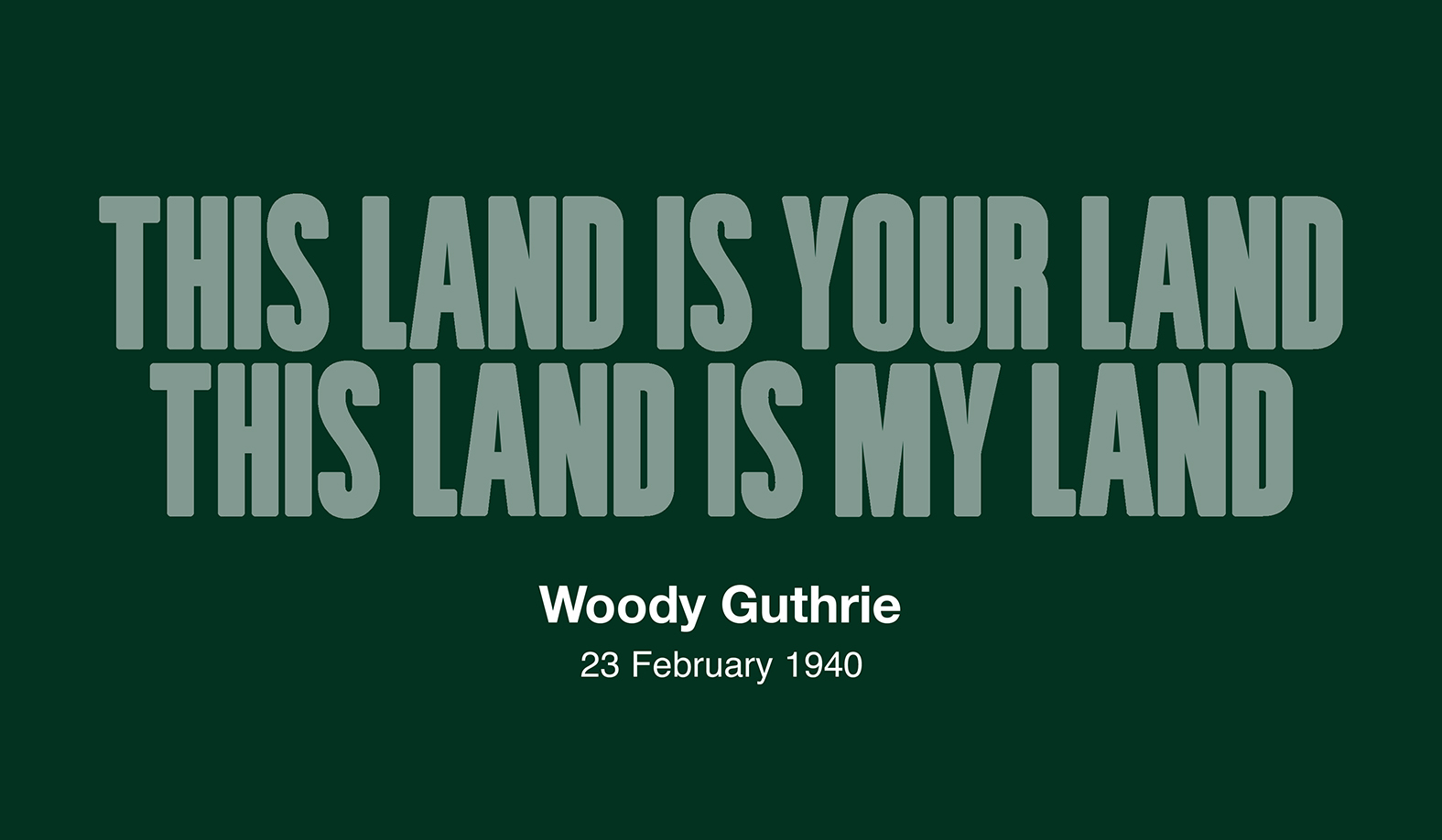
On Sunday, 23rd February 2025, it will be the 85th anniversary of Woody Guthrie writing his anthemic This Land is Your Land, This Land is My Land. Ever since, it has been sung out loud and proud as an American – and global – song of resistance.
In February 1940, the United States hadn't yet entered World War Two – that wouldn't come for almost another two years following Imperial Japan's deadly air attack on the US naval base, Pearl Harbour. Nazi Germany was in the process of taking all of Europe by blitzkrieg. The Soviet Union had been quelled by the shameful and treacherous Ribbentrop-Molotov pact.
Whilst US President Roosevelt's sympathies were with Churchill and with the British armed forces leading the resistance both in Europe and South-East Asia, American support was purely economic, consisting of transactional lend-lease arrangements which were entirely of benefit to US business.
American public opinion was for non-intervention, appeasement – but for a section of the American right it went further. Just like the Daily Mail’s notorious front page 'Hurrah for the Blackshirts', there are many in America who resent being reminded that a year previously to Woody penning his song 20,000 America Nazis had filled the famous Madison Square Garden. They sieg heil'd their American support for Hitler to a huge backdrop of George Washington, squeezed between two equally large swastika flags.
Such was the context of This Land Is Your Land. In Mike Marqusee's brilliant book Chimes of Freedom: The Politics of Bob Dylan's Art (updated and expanded as Wicked Messenger:Bob Dylan and the 1960s). Mike provides the details of Woody's authorship including the missing lines 'purged' from the more sanitised version that has become popular ever after:
"A big high wall there that tried to stop me
A sign was painted said: Private Property"
and
"One bright sunny morning in the shadow of the steeple
By the Relief office I saw my people -
As they stood hungry, I stood there wondering if
This land was made for you and me."
One can scarcely imagine JD Vance, adopting such lines as his Hillbilly Elegy theme tune. And therein lies, despite their tuneful exposure by Woody and in our time by others too, the dangerously successful falsehoods, of the populist right's appeal, Trumpian and Faragist versions.
Mike Marqusee is much missed by many including myself. He was that very rare kind, a public intellectual, a hugely creative political organiser – at the height of opposition to the Iraq War only Mike would have the idea and the ability to organise an Iraq v USA football match, with Philosophy Football (of course) providing the kits. And he was a gloriously gifted writer who was as much at ease writing about Dylan, his Jewish identity, Muhammad Ali and most of all his quixotically American love of cricket, as about Labour Party politics.
It is his take on the latter that helps explains Mike's disavowal of one particular accolade This Land is often accorded:
'"The song combines a sense of longing and belonging, and has been cursed with the sobriquet of the 'alternative national anthem'."
By political inclination I'm a pluralist. I simply have no interest in a political culture founded on the pressing need for all of us sharing the same label, 'left' or Labour or any other, to entirely agree with one another and exclude those whom we don't. In my experience I learn just as much engaging with those I don't share wholehearted agreement with as those whom I do. I would often debate with Mike his rejection of the national popular, in particular Englishness, his position he waggishly entitled 'Anyone but England.' Yet despite our disagreement his position was always far more illuminating, instructive than Sir Keir's entirely performative 'progressive patriotism,' never to be articulated minus a Union Jack draped somewhere or other in the camera shot.
However, this rejection of the national popular, if you like This Land as an 'alternative national anthem' can often lead to a broader rebuttal of a Gramscian (yes, yes Philosophy Football do a Gramsci T-shirt too) politics that focuses on popular culture rather than the kind of spaces varying parts of the left are considerably more comfortable in, from the electoral arena via the picket line to the rarefied world of planet placard, as an absolutely central site where ideas are contested and changed. A focus that recognises and doesn't downgrade the meaning given by many to their nation being key to this. In this sense the very special power of This Land is that it is both, and at the same time, universal and very distinctly American.
And it is this mix, the national, the popular and the radical that framed not only Woody but also future generations who sang in their different ways of who their land belonged to. Nina Simone, Bob Dylan and Joan Baez via Patti Smith, TheClash, The Specials andBilly Bragg to new generation minstrels of change Grace Petrie, Joe Solo and Calum Baird with plenty more where that rebel-rousing lot came from. Now that's what I call a soundtrack of however revolutions per minute takes your fancy.
Mark Perryman is the co-founder of Philosophy Football
The 85th anniversary This Land Is Your Land T-shirt is available exclusively from the self-styled 'sporting outfitters of intellectual distinction' akaPhilosophy Football here

Happy 80th Birthday Bob Marley
01.02.25
Philosophy Football's Mark Perryman celebrates the meaning of Bob Marley

As self-styled 'sporting outfitters of intellectual distinction' Philosophy Football we've made our name by going in search of philosophical quotes that explain the meaning of football and turn them into T-shirts, name and squad number on the back. Unique? We like to think so, our first, existentialist and Algerian international goalkeeper Albert Camus, swiftly followed by Gramsci.
Imagine our joy therefore when we found out that Bob Marley had waxed lyrical about this love of the game: " Football is a part of I when I play the world wakes up around me.' Into production ahead of Bob's beloved Jamaica making their World Cup debut at France '98 we made him our number eleven. Club side? As a man of the people we reckoned Bob might fancy turning out for Kingstonian FC, not Jamaica's capital but south London's premier non-leaguers.
The shirt proved instantly popular, a tad too popular. The Bob Marley Foundation got to hear about it and sent us a writ for breach of copyright demanding it be immediately withdrawn. We had become kind of used to this. Not many T-shirt companies have been sued by Eric Cantona, Hergé of Hergé's Adventures of Tintin fame and now Bob Marley! But when we explained what we were about, two football fans with the idea of mixing our love of the game with our interest in ideas and design, plus in those days wildly ambitious festivals on London's South Bank celebrating the global culture of football, the foundation were so impressed they insisted for Bob's shirt we remove our legal get-out of jail description ' strictly unofficial' and make ours The Official Bob Marley Football Shirt. Blimey were we chuffed, not 'alf.
Next Thursday, 6th February, would have been Bob Marley's 80th birthday, sparking memories of howe we described his place in our textiled squad. Playing of the ball on the grass, no dope far out on the wing, climbing high as a kite to catch the long ball. To celebrate the birthday, the shirt has been re-introduced into our unique line-up to rejoin Camus, Gramsci, Sartre and others who prefer to play the game deep.
But this is a moment also to reflect on the meaning of Bob Marley and others like him. The writer and activist David Widgery had a neat way of describing his politics as against miserabilsm:
" There is a real danger of getting too depressed about the apparent triumph of a particularly tawdry and irresponsible sort of finance capitalism and the state of the labour movement and the cowardice and lack of vision of its leadership. But I'm very against miserabilism."
David wrote those words at the peak of Thatcherism reinforced by the flag-waving aftermath to the 1982 Falklands war. Labour was drifting under the leadership of Neil Kinnock. The latter having led CND marches promptly dropping any such commitment once leader. The miners in 1984 suffering a catastrophic defeat. And this sorry lot of the early 1980s was just for starters. David Widgery was 'against miserablism' because what precisely does being miserable achieve?
Widgery had form on the subject. He was one of the architects of the greatest fusion of a popular agitational politics with a popular joyful music, Rock against Racism. And he had no time for those he would otherwise agree with politically who couldn't grasp the significance:
" Marxists who turn socialism into something as obscure as particle mechanics."
As we danced to The Clash, Buzzococks, Tom Robinson Band, Elvis Costello, X-Ray Spex, Stiff Little Fingers the punk mainstays of Rock against Racism mixed with UK reggae's Steel Pulse, Aswad, Misty and Roots, Matumbi the musical-political combination was natural, vital and most of all wonderfully fun.
Daniel Rachel's superb book Walls Come Tumbling Down chronicles how Rock against Racism segued into 2 Tone, a musical movement that didn't have to spell out A-G-A-I- N-T- R-A-C-I-S-M it was fundamental to the music, the fashion, the line-up of everything about 2 Tone and in particular label mates The Specials, The Selecter and The Bodysnatchers.
Bob Marley symbolises the potential but also the pitfalls of an anti-racism we can dance to such as this. In the late 1970s Chelsea had amongst its fanbase a fascist hardcore who when who whenwhen theSkaanthem The Liquidator was played over the Stamford Bridge PA system as the team ran out would loudly insert into that pregnant pause in the opening bars 'British Movement boom boom' an outfit for those who found the Nazi National Front a tad moderate. An anti-racism without musical accompaniment is entirely miserabilist. But music, the same goes for football,that doesn't make the connection between a multicultural soundtrack or team line-up and the society both exist alongside has a nasty habit of leaving any meaning on the dancefloor or pitch. A territorial anti-racism that is all about liking the music, the player but asfor the rest who share his or her skin colour, religion, country they came from to our's, leave it out. Or words, actions a damn sight worse. How that connection is made in a manner that is popular, connective rather than waving a placard with a slogan that simply tells those whom the intention is to reach simply they're wrong, wrong, wrong won't do it. Neverhas, never will.
Jammin' is what Bob Marley excelled in. Never for one moment did his music make us miserable. He lifted our sights to the possible which seemed all but impossible. Oh, and he understood that at it's best our much-fabled 'people's game' had every potential to do the self-same. In contrast to the activist-speak sloganising of ' Stop this, Fight that, Smash theother' Bob Marley's words ' I believe racism, hatred and evil can be healed with music' positions popular culture in any contest of ideas not as a sideshow but absolutely central. A practical understanding of how to reverse the current popular drift to increasingly hateful times, and better still one we can dance to. Thanks for everything Bob Marley and many happy returns.
Mark Perryman is the co-founder of Philosophy Football
Philosophy Football's Bob Marley T-shirt is available here

Twelve Books of Christmas
21.12.24
Mark Perryman provides our gloriously eclectic annual seasonal reading selection
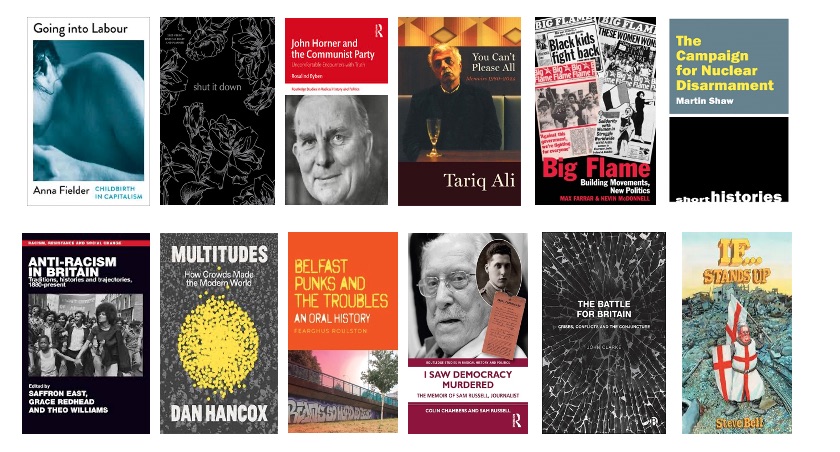
OK twelve books in twelve days competing for attention with the holly and the ivy if not peace and goodwill, and all before Hogmanay descends upon on us might too much for even the most avid bibliophile. So more of a guide for what to look forward to snapping up by way of the means of post-seasonal intellectual recovery ready for what 2025 has in store for us.
1. Going into Labour

' A Marxist analysis of childbirth and birth care' just the ticket for a day marking the most famous incident of giving birth in human history. A manger, three Kings, assorted shepherds with sheep, all lit by a star, and God knows (well if anyone knows he/she should) what up above, but not a gynaecologist in sight. Anna Fielder provides a unique insight into the everyday experience of what for many others, not just Mary and Joseph, will be the most momentous event of their lives. Yet framed by capitalism, colonialism, misogyny not for all the pleasure it should be.
From Pluto books here
2. Verso Radical Diary and Planner 2025

Christmas Day out of the way, leftovers to mop up, never-ending pile of mince pies to tuck into, Christmas wrapping-paper sorted for recycling. Only one task remaining for Boxing Day, for those with a life not entirely taken over by their smartphone to organise every sentient minute of the day, order a 2025 diary. And only one choice for any self-styled organic intellectual, Verso's. Combining the stylishness Verso is rightly renowned for with a daily and monthly digest of history and insights to provide a 365-day guide to the radical and revolutionary. One missing mind, 13 October 2025, the centenary of Margaret Thatcher's birth. And yes there will be a Philosophy Football Centenary mug specially designed for us by Steve Bell. All together now, ' Maggie, Maggie, Maggie. Out! Out! Out!
From Verso books here
3. John Horner and the Communist Party: Uncomfortable Encounters with Truth
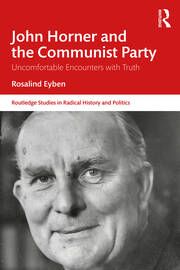
The 2024 General Election was marked by Jeremy Corbyn elected as an independent left MP despite everything the Labour Party threw at Islington North to stop him. And they did the same in Brighton Pavilion, throwing everything at it to take the seat back from The Green Party, and failing there too. Add in the four Muslim independent MPs plus three more Green MPs and this is quite a bloc. Rosalind Eyben's superb book tells the story of an earlier era of left-of-Labour hope. The Communist Party of the 1930s, the Popular Front, fighting an anti-fascist war at home, solidarity with the Red Army on the Eastern Front away. Willie Gallagher and Phil Piratin elected Communist Party MPs as part of Labour's 1945 landslide. Hopes dashed not much more than a decade later by Stalin's 1956 invasion of Hungary. All told via the life of John Horner, Communist, creator of the modern Fire Brigades Union when it was needed more than ever before, the Blitz, and Rosalind's father. The maxim ' the personal is political' could have been written for this most special book.
From Routledge here
4. You Can't Please All: Memoirs 1980-2024
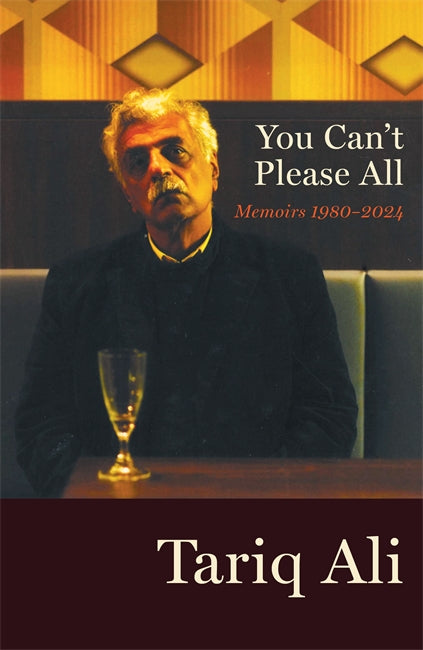
2024, follows 1945, 1964 and 1997 as a year of a Labour landslide. Yet a decent chunk of the Left while happy to bid a none too fond farewell to 14 years of Tory (with a little help from Nick Clegg) 'progress' aren't exactly dancing in the streets, marching morelike. Tariq Ali has been a towering figure of this outside left for the best part of 60 years. His memoir of the 1960s Street Fighting Years has recently been reissued to accompany Tariq's new post 1968 memoir, You Can't Please All. A spellbinding testimony of the revolutionary expectations that framed a generation via Vietnam, Black Power, the Prague Spring. And how they helped some stay the course through what the ensuing almost half century threw at his Generation Left. A vital read for all who seek to stay the course, but especially today's Generation Left formed by the 2010 University Tuition Fees protest movement, 2015-19 Corbynism and 2023- Gaza, as they pass through their thirtysomethings.
From Verso books here
5. Big Flame: Building Movements, New Politics
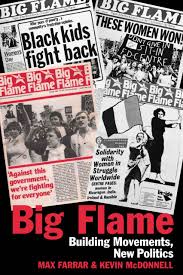
There is widespread expectation that the New Year will be marked by Jeremy Corbyn launching an as yet without a name new party of the Left. Wags may suggest we've had one of those before, Tariq Ali's own International Marxist Group just one of the 57 varieties of, before in time-honoured fashion splitting to create even more varieties. Jeremy will be hoping against hope to avoid the pitfalls of previous efforts, but one deserves some closer study than an otherwise record of unmitigated failure. Max Farrar and Kevin McDonnell retell the story of 'Big Flame' this most creative effort to combine the personal, the local and the political in a formation that was part party and part movement. If Jeremy's outfit can achieve that combination it might, just, be on to something.
From Merlin Press here
6. The Campaign for Nuclear Disarmament

A lifetime ago I was a student at Hull University. This was 1978-81 at the height of opposition to the renewal of Britain's nuclear deterrent (sic) with Trident submarines and the basing of US Cruise missiles at Greenham and Molesworth. Martin Shaw was a lecturer at Hull and inspired so many of us with his vision of, and arguments for, a nuclear weapon-free Europe. Despite CND's decline he remains one of the best thinkers for what a broad, imaginative and effective movement looks like. Making his history an essential read at this time of precious little peace and not much goodwiil.
From Agenda Publishing here
7. Anti-Racism in Britain: Traditions, Histories and Trajectories, 1980 - present
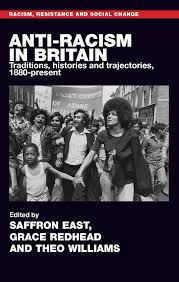
Edited by Saffron East, Grace Redhead and Theo Williams their book is a most timely historical survey of anti-racism in Britain. Combining a richly imaginative thematic approach with the historic Anti-Racism in Britain ranges over the colonial legacy of Empire via the politics of emergent diasporas to the contestation around 'multiculturalism'. An essential read with the current across-the-political-spectrum stirring of anti-immigration sentiment. Just one request to the publisher tho', this title deserves a cheaper paperback edition, pronto.
From Manchester University Press here
8. Multitudes
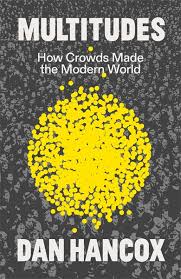
Vietnam, Nuclear Disarmament, Iraq, anti-racism, and currently Gaza, all, and more, have each sparked huge protest movements. Dan Hancox's hugely original Multitudes places the simple and timeless exercise of marching for or against come what may in a quite different context, the making of a crowd. The convivial and the political are too often alien to one another but for good, or bad, when they coalesce the crowd becomes a movement. A book that lands somewhere infinitely richer than Planet Placard. Hurrah!
From Verso books here
9. Belfast Punk and The Troubles: An Oral History
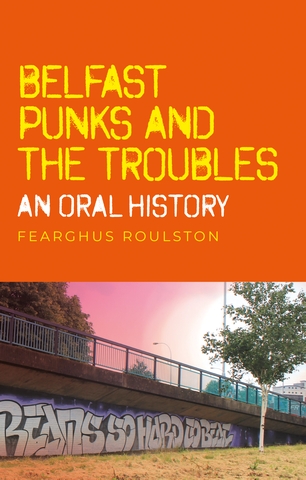
To brighten the seasonal political mood, the sight of the lead singer of 1970s Northern Irish Punk Band The Undertones, best known hit a heartfelt tribute to adolescent boys' masturbation Teenage Kicks, emerging as the effective leader of the movement against inland and coastal waters pollution. Who would have thought when we were pogoing away to Feargal Sharkey belting out 'Get teenage kicks right through the night, all right' he'd end up being the eloquent spokesperson for the unanswerable case to renationalise the water boards. Poster boy of the counterghemony? Feargal fits the bill, perfectly. And to understand how, and why, Fearghus Roulston unravels the culture of late 1970s, in the words of another band of the period and place, Stiff Little Fingers, Alternative UIster. Sus-Sus-Suspect Device.
From Manchester University Press here
10. I Saw Democracy Murdered: The Memoir of Sam Russell, Journalist
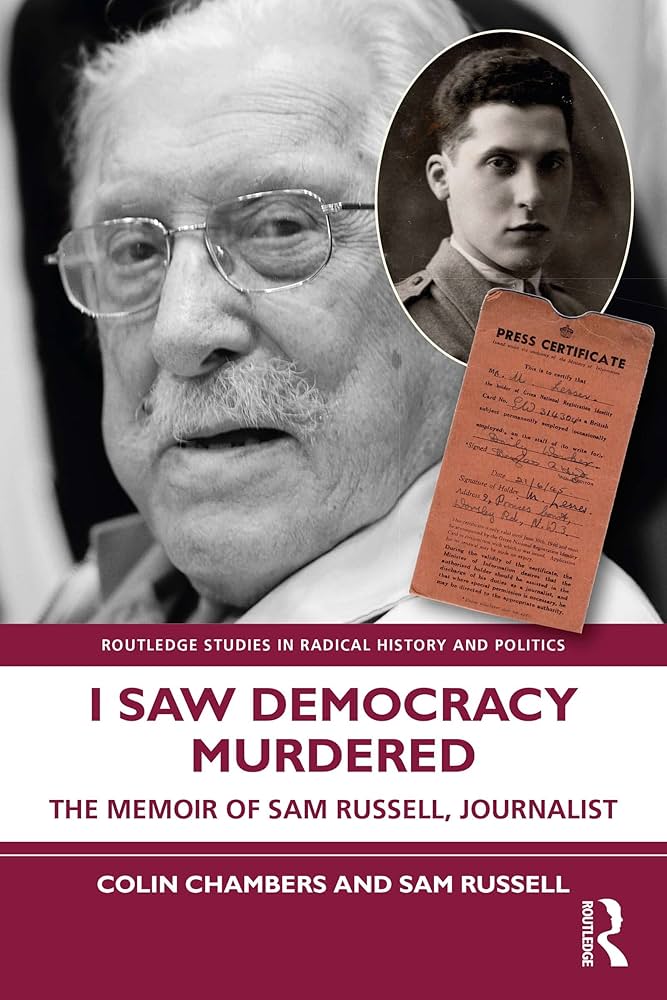
The inspiration for Philosophy Football's Dissenter range of T-shirts in large part came from the 1930s Popular Front against fascism, and in particular the International Brigades who fought to defend the Spanish Republic. It was Sam Russell who advised us on our designs and would speak at our events to honour and celebrate the Brigaders. It is almost unimaginable the idea that civilians with no military training woud travel to Spain defying border controls and arrest to take up arms. George Orwell the most famous who did so. The biggest sijngle contingent of the International Brigades British Battalion? Welsh miners. Sam's memoir, co-written with Colin Chambers, tells his own fascinating story of the impact being an International Brigader had on his politics, his journalism for the Daily Worker and Morning Star, the shaping of his anti-stalinist communism.
From Routledge here
11. The Battle for Britain: Crises, Conflicts and the Conjuncture

The beginning of the idea that burst into becoming Philosophy Football in October 1994 came in the late 1980s from the magazine I was working for back then Marxism Today and our wannabe hegemonic project that combined ideas with, yes T-shirts. 'Central Committee Outfitters', a name almost as good as ours! And my co-founder, Hugh Tisdale, followed a not entirely different trajectory. When I first met Hugh he was the designer of Democratic Left's (the post-1989 short lived successor to The Communist Party) fortnightly newspaper New Times. So what a wonderful surprise package of ideas to read in John Clarke's new book, applying the conceptual analysis John first pioneered with the much-missed Stuart Hall to the present, or as John and Stuart would teach us the 'conjuncture'. An incredible intellectual treat to start the year.
From Bristol University Press here
12. If... Stands Up

Our Five Star pick for a read to start 2025 is Steve Bell's If... Stands Up. Part collection of Steve's final (lets hope not) five years of his If... cartoon strip and part diarisation of his appalling treatment by the Guardian for whom he'd provided both If.. and comment page cartoons for 42 years. The cartoon he was got rid of for was about Gaza, the Guardian editor deemed it anti-semitic, a charge Steve refutes in the most effective way imaginable: "As to the truth of whether my fatal cartoon was actually antisemitic or not. When the Israeli cartoonists' association asked that very question, and took a vote on it, that vote was unanimous: it was not. And I will take that opinion over that of a gaggle of Guardian editors any day of the week." And in their ill-gotten cause those same editors have replaced Steve's artistic sharpness on the comment pages with the effortlessly bland while If... hasn't been replaced at all, these hapless editors discovering, too late, it's irreplaceable. Never mind, on p181 we were delighted to read " My friends at Philosophy Football have helped keep me sane, as well as active, by suggesting more and more daft merchandising ideas". To which we can only add, happy to oblige Steve!
From Verso books here
Philosophy Football's daft Steve Bell merchandising ideas from here
Note Almost all book links in this review offer special discounts. None of these links are to Amazon, if you can avoid giving money to a tax-dodging company that seeks to prevent their employees from joining a trade union please do so.
Mark Perryman is the co-founder of the self-styled 'sporting outfitters of distinction' aka Philosophy Football
- The Death of Innocence
27.12.25 - Thatcherism Today
04.10.25 - Top Ten Books to Understand Labour Conference
26.09.25




